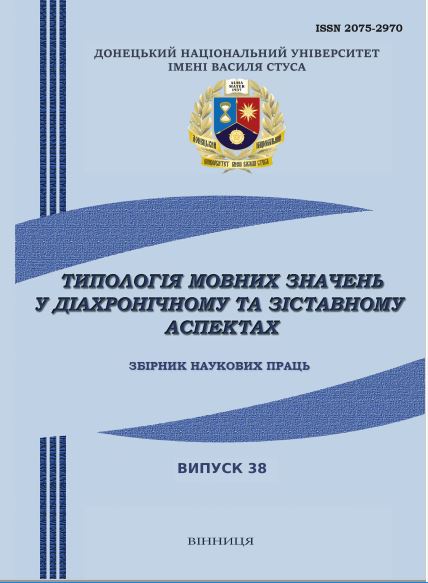Structural Peculiarities of Idioms with the Lexical Сomponent ‘ВОДА’ in the Ukrainian Language and the Component ‘WATER’ in the English Language.
DOI:
https://doi.org/10.31558/2075-2970.2019.38.7Keywords:
idiom, substantive idiom, adjective idiom, verbal idiom, adverbial idiomAbstract
The article dwells upon structural features of the idioms with the lexical component ‘ВОДА’ in the Ukrainian language and the lexical component ‘WATER’ in the English language. The topicality of the article is stipulated by the scholars’ attention to the contrastive researches of the idioms in English and Ukrainian. The aim of the article is to define and describe the grammatical features of the idioms with the component ‘ВОДА’ in Ukrainian and the component ‘WATER’ in English. The article focuses on 382 idioms (251 English idioms with the component ‘WATER’ and 131 Ukrainian idioms with the component ‘ВОДА’). The research resorts to the following research methods: a continuous sampling method, methods of analysis and synthesis; a descriptive method and the distributive method. The results of the analysis show the existence of isomorphic structural groups of the idioms with the component ‘ВОДА’ in the Ukrainian language and the component ‘WATER’ in the English language apart from the allomorphic structural models, which exists only in one of the languages under consideration. The allomorphic group of the English language is represented by compound words, as the meaning of the lexeme becomes the unit of the second nomination, acquiring metaphoric meaning. The isomorphic groups are word combinations and sentences. The most productive group of the idioms with the component ‘ВОДА’ in Ukrainian and the component ‘WATER’ in English are word combinations which can be divided into substantive, adjective, verbal, and adverbial idioms.References
Alefirenko, M. F. (1987). Teoretychni pytannia frazeolohii. Kharkiv: Vyshcha shkola.
Bilous, Yu. V. (2014). Komunikatyvno-prahmatychnyi potentsial frazeolohichnykh odynyts z somatychnym komponentom u nimetskii movi. Naukovyi visnyk Mizhnarodnoho humanitarnoho universytetu. Seriia: Filolohiia. Odesa.Vyp. 8, T. 1. S. 55–58.
Demskyi, M. T. (1984). Hramatychni osoblyvosti ukrainskoi diieslivnoi frazeolohii. Movoznavstvo. № 2. S. 24–32.
Zadorozhna, I. (2014). Nimetskomovni frazeolohichni odynytsi z komponentamy imennykamy "spaß", "gnade" ta "freude" (otsinnyi, emotyvno-ekspresyvnyi ta funktsionalno-stylistychnyi aspekty znachennia). Naukovyi visnyk Chernivetskoho universytetu. Hermanska filolohiia. Vyp. 708–709. S. 78–81.
Ighnatenko, D. Je. (2013). Frazeologhizmy na poznachennja intensyvnosti diji v anghlijsjkij ta ukrajinsjkij movakh // Studia Germanica et Romanica : Inozemni movy. Zarubizhna literatura. Metodyka vykladannja. Donecjk :DonNU. T. 10, № 2 (29). S. 57–68.
Kuchman, I. M. (2007). Dijeslivni frazeologhichni odynyci kauzatyvnoji semantyky z komponentom "chastyna tila". Naukovyj chasopys Nacionaljnogho pedaghoghichnogho universytetu imeni M. P. Draghomanova. Serija 10 : Problemy ghramatyky i leksykologhiji ukrajinsjkoji movy. Kyjiv : Vyd-vo NPU imeni M. P. Draghomanova. Vyp. 3. S. 211–219.
Lysenko, L. O. (2016). Kontrastyvnyi aspekt u vyvchenni frazeolohichnykh odynyts iz komponentom vohon (na materiali ukrainskoi ta anhliiskoi mov). Naukovi zapysky KDPU. Seriia: Filolohichni nauky (Movoznavstvo). Kirovohrad : Vydavets Lysenko V. F. Vyp. 146. S. 245–249.
Markova, D. (2017). Frazeolohizmy z komponentom sertse na poznachennia nehatyvnykh pochuttiv (na materiali ukrainskoi, polskoi, anhliiskoi ta nimetskoi mov). Naukovyi visnyk Skhidnoievropeiskoho natsionalnoho universytetu imeni Lesi Ukrainky. № 3. S. 113–117
Mizin, K. I. (2013). Ustaleni porivnjannja anghlijsjkoji, nimecjkoji, ukrajinsjkoji ta rosijsjkoji mov krizj pryzmu chasovogho kodu kuljtury: zistavno-linghvokuljturologhichnyj aspekt. Linghvistyka. № 2. S. 13–20. Rezhym dostupu:http://nbuv.gov.ua/UJRN/ling_2013_2_4

